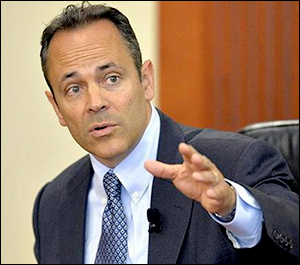By Jim Ellis
Jan. 9, 2019 — Blue Grass State politics are beginning to boil, all centered around the 2019 governor’s race. With the candidate filing deadline fast approaching on Jan. 29 for the May 21 statewide primary, several individuals are announcing that they will challenge unpopular Gov. Matt Bevin (R), including a Republican state legislator who is expected to make his formal declaration today.Though the governor has said he intends to seek a second term, and did so again a week before Christmas, the fact that he has yet to file a 2019 campaign committee has fueled speculation that he may decide to retire. Bevin was elected in 2015 with a relatively substantial 52.5 – 43.8 percent victory over then-Attorney General Jack Conway (D) after upsetting then-agriculture commissioner and now US congressman, James Comer (R-Tompkinsville), by just 83 votes in a May Republican primary that drew almost 215,000 voters.
Bevin’s popularity ratings, however, have largely been upside-down throughout his tenure in office. According to the Morning Consult quarterly national gubernatorial approval rankings that were released just before the November elections in mid-October, Gov. Bevin ranked 46th on the nationwide list, with a 30:55 percent positive to negative ratio.
None of those finishing below the Kentucky governor on that particular scale in October remains in office. The least popular, according to the survey, Oklahoma Gov. Mary Fallin (R), was ineligible to seek a third term last November. Republican Kevin Stitt replaced her. Connecticut Gov. Dan Malloy (D) did not seek a third term and Democrat Ned Lamont held the office. Illinois Gov. Bruce Rauner (R) was defeated for re-election, and Alaska Independent Gov. Bill Walker withdrew before the election because his political situation was hopeless.
Among the 10 governors with the most unfavorable approval ratings before the general election, only Rhode Island Gov. Gina Raimondo (D) remains in office aside from Bevin. She won a 53-37 percent re-election victory on Nov. 6. The others, in addition to Fallin, Malloy, Rauner, and Walker, Govs. Susana Martinez (R-NM), Paul LePage (R-ME), and Rick Snyder (R-MI) were ineligible to seek re-election while Wisconsin’s Scott Walker (R) lost his bid for a third term.
Just this week, action occurred among Kentucky Republicans. Rep. Comer said he would run for governor this year if Bevin decided to retire, and state Rep. Robert Goforth (R-East Bernstadt) today is scheduled to make his formal announcement challenging the governor in the GOP primary.
Three Democrats have announced their intention to run, the most prominent being Attorney General Andy Beshear, the son of former Gov. Steve Beshear (D). Former state Auditor Adam Edelen, a chief of staff to Gov. Beshear who lost his bid for re-election in 2015, and state House Minority Leader Rocky Adkins (D-Sandy Hook) are competing with Beshear for the party nomination.
Three states are holding gubernatorial races this year, and all look to be competitive. In addition to the Kentucky contest, Louisiana Gov. John Bel Edwards (D) seeks re-election in what is expected to be a hard-fought election campaign, and the open Mississippi race already appears to be a major battle between Lt. Gov. Tate Reeves (R) and Attorney General Jim Hood (D). The winner succeeds term-limited Republican Gov. Phil Bryant.
As was the case with most of the governors on the ballot in 2018, these three current gubernatorial positions all carry redistricting veto authority, so each is important from a national perspective. However, none of the states is expected to gain or lose a congressional seat in the next reapportionment, and Republicans dominate all three current US House delegations. Therefore, paying national political attention to these current gubernatorial contests is warranted.

